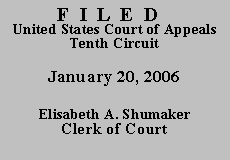

| ANTHONY STUART SIMMS,
v.
CARL GIBSON, SAM STOSE,
BEVERLY MCKEE, SCOTT
JULIAN, and JIM HALLETT |
No. 05-5159
(D.C. No. 05-CV-098-E) |
Simms was stopped by Officer Sam Stose for a traffic violation, which led to Stose finding marijuana and marijuana-related paraphernalia. He was represented by a lawyer when he was brought into state court in Nowata County, Oklahoma on charges of possession of marijuana and possession of paraphernalia. In front of Judge Carl Gibson, he pled guilty to both charges.
Simms now sues under 42 U.S.C. § 1983, arguing that Stose engaged in an illegal search. He also argues that Judge Gibson, Assistant District Attorney Scott Julian, Nowata County Clerk Beverly McKee, County Sheriff Jim Hallett and Stose were members and servants of the "Nowata County domestic enemies of the Constitution" and violated RICO by trying to extort money from him by prosecuting him and accepting his guilty plea.
All defendants filed motions to dismiss. Simms moved for default judgment against Gibson. The district court denied the motion for default judgment and dismissed Simms' complaint for failure to state a claim against any defendant.(1)
The district court's decision to dismiss all claims was proper. We review de novo a district court's decision to dismiss for failure to state a claim upon which relief can be granted. Beck v. Muskogee Police Dept., 195 F.3d 553, 556 (10th Cir. 1999). Simms' guilty plea in Oklahoma state court clearly precludes his § 1983 claim challenging the legality of his arrest. See Franklin v. Thompson, 981 F.2d 1168, 1171 (10th Cir. 1992). His guilty plea similarly bars his RICO claims because a defendant cannot bring a civil action that undermines the validity of his conviction unless "the conviction or sentence has been reversed on direct appeal, expunged by executive order, declared invalid . . . or called into question by a . . . writ of habeas corpus." Heck v. Humphrey, 512 U.S. 477, 486-87 (1994). Further, the district court was right to note that Gibson is protected by absolute immunity because "judges defending against § 1983 actions enjoy absolute immunity from damages liability for acts performed in their judicial capacities." Dennis v. Sparks, 449 U.S. 24, 27 (1980) (internal quotations omitted).
Accordingly, we AFFIRM the district court's order dismissing Simms' complaint.
ENTERED FOR THE COURT
Carlos F. Lucero
Circuit Judge
*.The case is unanimously ordered submitted without oral argument pursuant to Fed. R. App. P. 34(a)(2) and 10th Cir. R. 34.1(G). This order and judgment is not binding precedent, except under the doctrines of law of the case, res judicata, and collateral estoppel. The court generally disfavors the citation of orders and judgments; nevertheless, an order and judgment may be cited under the terms and conditions of 10th Cir. R. 36.3.
1. The district court's decision to deny Simms' motion for default judgment was clearly correct. We review a district court's failure to grant default judgment for abuse of discretion. In re Rains, 946 F.2d 731, 732 (10th Cir. 1991). Because Simms did not apprise the court of any failure to fail to plead until after all defendants had appeared, and because no party was "essentially unresponsive," Cessna Fin. Corp. v. Bielenberg Masonry Contracting, Inc., 715 F.2d 1442, 1444 (10th Cir. 1983), the district court did not abuse its discretion in denying Simms' motion for entry of default judgment.